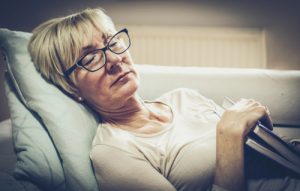Posted on Monday, November 4th, 2019 at 4:14 am
The Mayo Clinic states that the average age a woman experiences menopause is 51, but some women may experience menopause even earlier in their 40s, and some women may not experience it until their late 50s. The bottom line is that menopause is a natural biological process.

Some of the most common symptoms of menopause that can also be signs of sleep disorders may include:
- Weight gain
- Irregular periods that vary in frequency or intensity
- Osteoporosis
- Hot flashes
- Joint or muscle pain
- Difficulty sleeping
- Decreased sexual interest or discomfort
- Poor concentration or memory loss
- Vaginal and urinary problems
- Mood swings or irritability
Other symptoms of sleep apnea may be dismissed as being the effects of growing older. Loud snoring or other pauses in breathing while sleeping are some of the most common signs of sleep apnea and deserve to be examined more closely.
Menopause can increase the likelihood of sleep apnea because the levels of estrogen and progesterone that are high before a woman undergoes menopause will decline and become much lower after menopause. One study of women in multiple age groups found that the prevalence of moderate to severe obstructive sleep apnea increased less than 1 percent in women between 20 years of age and 44 years of age, 2 percent in women 45 years of age to 64 years of age, and 7 percent in women 61 years of age to 100 years of age.
A post-menopausal woman who underwent hormone replacement therapy had much lower rates of sleep apnea prevalence than women who did not receive hormone replacement therapy. Grace Pien, an assistant professor of medicine at the Johns Hopkins Sleep Disorders Center, said postmenopausal women are two to three times more likely to have sleep apnea compared with premenopausal women.
Hormone replacement therapy involving estrogen and progestin can be beneficial to many women in addressing sleep apnea issues. In other cases, exercise could be recommended, and selective serotonin reuptake inhibitors (SSRIs) or hormone replacement therapies could also be used.
Contact Silent Night Therapy
Women who are dealing with signs of menopause that could also be symptoms of sleep apnea should contact Silent Night Therapy for help. Dr. Clifford Brown has been helping New York residents with sleep apnea since the 1970s and is a member of The American Academy of Dental Sleep Medicine (AADSM) and The Academy of Clinical Sleep Disorder Disciplines who is trained in Dental Sleep Medicine and Oral Appliance Therapy.
We work with most insurance companies so clients can avoid paying most out of pocket expenses. We can talk about how our team can help you when you call (631) 983-2463 or contact us online.